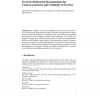Free Online Productivity Tools
i2Speak
i2Symbol
i2OCR
iTex2Img
iWeb2Print
iWeb2Shot
i2Type
iPdf2Split
iPdf2Merge
i2Bopomofo
i2Arabic
i2Style
i2Image
i2PDF
iLatex2Rtf
Sci2ools
ISAMI
2010
2010
Toward a Behavioral Decomposition for Context-Awareness and Continuity of Services
Many adaptative context-aware middleware exist and most of them rely on so-called vertical architectures that offer a functional decomposition for contextawareness. This architecture has a weak point: it does not allow the system handling both dynamics of the changing environment and applications. To avoid this, we propose an approach for context-awareness based on a behavioral decomposition, and because each behavior must complete all functionalities necessary for contextawareness, we introduce an hybrid decomposition. It consists in a functional decomposition into a behavioral decomposition. This approach derives benefits from both decomposition, first allowing to handle environment and application's dynamics, second introducing reusability and modularity into behaviors.
Behavioral Decomposition | Decomposition | Emerging Technology | Functional Decomposition | ISAMI 2010 |
| Added | 13 Feb 2011 |
| Updated | 13 Feb 2011 |
| Type | Journal |
| Year | 2010 |
| Where | ISAMI |
| Authors | Nicolas Ferry, Stephane Lavirotte, Jean-Yves Tigli, Gaëtan Rey, Michel Riveill |
Comments (0)

